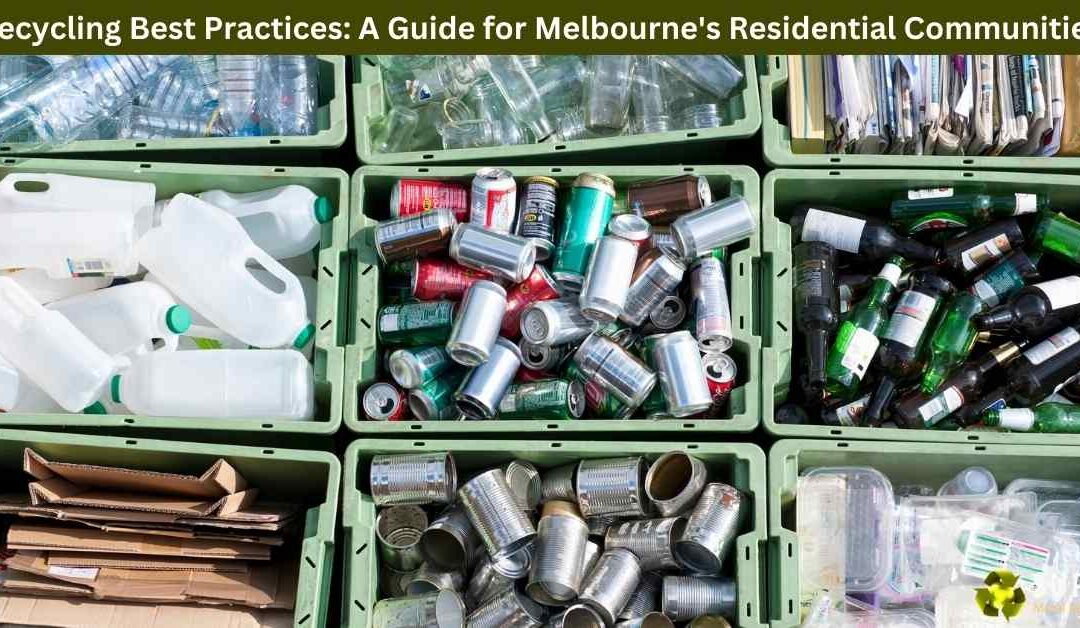Recycling has become an integral part of daily life for many in Melbourne, reflecting the city’s commitment to sustainability and environmental conservation. However, with ever-evolving guidelines and the complexities of waste management, it’s easy to feel unsure about the best practices for recycling. To help Melbourne’s residential communities navigate these challenges, this guide offers practical tips to ensure that recycling efforts are effective and contribute to a greener future.
Understanding What Can and Cannot Be Recycled
The first step in effective recycling is knowing what materials can be placed in your recycling bin and what should be disposed of differently. In Melbourne, common recyclable items include:
- Paper and Cardboard: Newspapers, magazines, office paper, cardboard boxes, and egg cartons.
- Glass: Bottles and jars (clear, green, and brown). Ensure they are clean and free from food residue.
- Plastics: Hard plastics labeled with recycling codes 1 to 5, such as drink bottles, milk jugs, and yogurt containers.
- Metals: Aluminum cans, steel cans, and empty aerosol cans.
Items that cannot be recycled in your curbside bin include plastic bags, polystyrene, ceramics, and batteries. These materials can contaminate the recycling stream, leading to entire loads being sent to landfill.
Preparing Items for Recycling
Proper preparation of recyclables ensures that they can be processed efficiently and effectively. Here are some best practices:
- Clean and Dry: Rinse containers to remove food or liquid residue. Wet or soiled items can contaminate other recyclables.
- Flatten: Flatten cardboard boxes to save space in your bin and make the collection process more efficient.
- Remove Lids: Take off lids from bottles and jars, as they are often made from different materials that require separate processing.
- Don’t Bag It: Avoid putting recyclables in plastic bags. Loose materials are easier to sort and process.
Sorting and Using the Right Bins
In Melbourne, it’s essential to use the correct bins for different types of waste. Typically, you will have:
- Yellow Bin: For recyclables such as paper, cardboard, glass, metal, and certain plastics.
- Green Bin: For organic waste like garden clippings, food scraps, and small branches.
- Red Bin: For general waste that cannot be recycled or composted.
Make sure to follow your local council’s specific guidelines, as they may vary slightly between areas.
Reducing Waste Before It Reaches the Bin
Recycling is important, but reducing waste at the source is even more impactful. Melbourne’s residential communities can adopt the following practices to minimize waste:
- Buy in Bulk: Purchase items in bulk to reduce packaging waste.
- Choose Reusable: Opt for reusable bags, containers, and bottles instead of single-use plastics.
- Repair and Reuse: Before discarding items, consider whether they can be repaired or repurposed.
- Compost: Set up a compost bin for organic waste, which reduces the amount of waste sent to landfill and provides nutrient-rich soil for your garden.
Staying Informed and Educating Others
Recycling guidelines can change, so it’s important to stay updated on the latest information from your local council. Melbourne’s councils often provide resources, workshops, and updates on recycling best practices. Participating in these programs can help you recycle more effectively.
Additionally, spreading awareness within your community is key to ensuring that everyone is recycling correctly. Share tips with neighbors, discuss common mistakes, and encourage others to participate in community recycling programs.
Participating in Local Recycling Programs
Many local councils in Melbourne offer additional recycling services for items not accepted in curbside bins. These may include:
- E-waste Recycling: Drop-off points for electronic waste like old computers, phones, and appliances.
- Hazardous Waste Collections: Special events for disposing of chemicals, paints, and batteries.
- Textile Recycling: Programs for donating or recycling old clothing and fabrics.
Check with your local council to find out what additional recycling services are available in your area.
Conclusion
Recycling is a shared responsibility that starts at home. By following these best practices, Melbourne’s residential communities can make a significant impact on reducing waste and conserving resources. Understanding what can be recycled, properly preparing items, using the right bins, and participating in local programs are all steps toward a more sustainable future.
As Melbourne continues to grow and evolve, its commitment to recycling will be essential in preserving the environment for future generations. With everyone’s participation, Melbourne can lead the way in effective waste management and environmental stewardship.
If you are in Springvale South, Victoria 3172, and looking for a metal recycling service, this is the best way to visit us.
Super Metal Recycling
345 Frankston – Dandenong Road, Dandenong South VIC 3175
(03) 9706 4909


Recent Comments